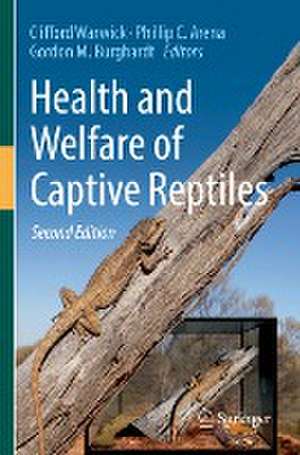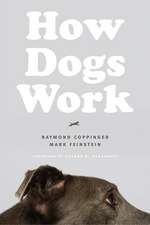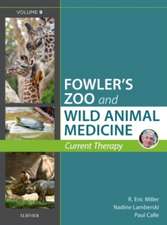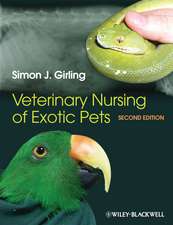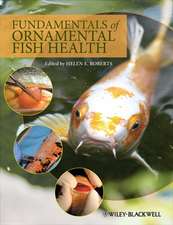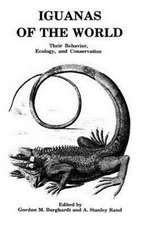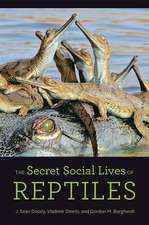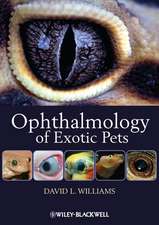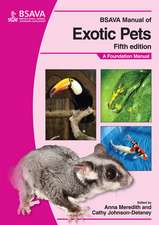Health and Welfare of Captive Reptiles
Editat de Clifford Warwick, Phillip C. Arena, Gordon M. Burghardten Limba Engleză Paperback – 25 ian 2024
This extensively revised and expanded new edition offers concepts, principles and applied information that relates to the wellbeing of reptiles. As a manual on health and welfare in a similar vein to volumes addressing the sciences of anatomy, behaviour or psychology, this book thoroughly examines the biology of reptile welfare and is about meeting biological needs.
The editors, acknowledged experts in their own right, have once again drawn together an extremely impressive international group of contributors. Positive and negative implications of general husbandry and research programs are discussed. In addition to greatly revised original content are nine new chapters offering readers novel insight into:
• sensory systems
• social behaviour
• brain and cognition
• controlled deprivation and enrichment
•effects of captivity-imposed noise and light disturbance on welfare
•spatial and thermal factors
•evidential thresholds for species suitability in captivity
• record keeping as an aid to captive care
•arbitrary husbandry practices and misconceptionsThe authors have adopted a user-friendly writing style to accommodate a broad readership. Although primarily aimed at academic professionals, this comprehensive volume is fundamentally a biology book that will also inform all involved in captive reptile husbandry. Among others, zoo personnel, herpetologists, veterinarians, lab animal scientists, and expert readers in animal welfare and behavioural studies will benefit from this updated work.
| Toate formatele și edițiile | Preț | Express |
|---|---|---|
| Paperback (1) | 1302.89 lei 6-8 săpt. | |
| Springer International Publishing – 25 ian 2024 | 1302.89 lei 6-8 săpt. | |
| Hardback (1) | 1637.39 lei 3-5 săpt. | +50.05 lei 7-13 zile |
| Springer International Publishing – 25 ian 2023 | 1637.39 lei 3-5 săpt. | +50.05 lei 7-13 zile |
Preț: 1302.89 lei
Preț vechi: 1371.47 lei
-5% Nou
Puncte Express: 1954
Preț estimativ în valută:
249.32€ • 266.60$ • 207.87£
249.32€ • 266.60$ • 207.87£
Carte tipărită la comandă
Livrare economică 17 aprilie-01 mai
Preluare comenzi: 021 569.72.76
Specificații
ISBN-13: 9783030860141
ISBN-10: 3030860140
Pagini: 638
Ilustrații: XI, 638 p. 1 illus.
Dimensiuni: 155 x 235 mm
Greutate: 0.9 kg
Ediția:2nd ed. 2023
Editura: Springer International Publishing
Colecția Springer
Locul publicării:Cham, Switzerland
ISBN-10: 3030860140
Pagini: 638
Ilustrații: XI, 638 p. 1 illus.
Dimensiuni: 155 x 235 mm
Greutate: 0.9 kg
Ediția:2nd ed. 2023
Editura: Springer International Publishing
Colecția Springer
Locul publicării:Cham, Switzerland
Cuprins
Chapter 1. Introduction.- Chapter 2. Physiology and Functional Anatomy.- Chapter 3. Sensory Systems.- Chapter 4. Biology of Stress.- Chapter 5. Normal Behaviour.- Chapter 6. Social Behaviour as a Challenge for Welfare.- Chapter 7. Brains, Behaviour, and Cognition: Multiple Misconceptions.- Chapter 8. Psychological and Behavioural Principles and Problems.- Chapter 9. Effects of Ontogeny, Rearing Conditions, and Individual Differences on Behaviour: Welfare, Conservation, and Invasive Species Implications.- Chapter 10. Controlled Deprivation and Enrichment.- Chapter 11. Effects of Noise and Light.- Chapter 12. Ethologically Informed Design and DEEP Ethology in Theory and Practice.- Chapter 13. Spatial and Thermal Factors.- Chapter 14. Nutritional Considerations.- Chapter 15. Naturalistic Versus Unnaturalistic Environments.- Chapter 16. Evidential Thresholds for Species Suitability in Captivity.- Chapter 17. Record Keeping as an Aid to Captive Care.- Chapter 18. Arbitrary Husbandry Practices and Misconceptions.- Chapter 19. Miscellaneous Factors.
Recenzii
“Health and Welfare of Captive Reptiles, Second Edition is a huge 19-chapter,638-pagebook … . it consists of a series of very detailed literature reviews on aspects of reptile physiology and behavior … . Each chapter is heavy with references. … Inclusion of the weblinks to those which are freely available in the reference lists is a welcome touch. … I suspect the book will prove most valuable to educators in veterinary schools and agricultural colleges” (Frances M. Baines, Animal Welfare, November 6, 2023)
Notă biografică
Clifford Warwick is an independent human medical scientist and reptile biologist. He holds several advanced professional qualifications specializing in reptile science, as well as a PhD in reptile welfare biology. He has produced approximately 150 peer-reviewed articles, book chapters and books, mostly concerning the biology and welfare of reptiles, with a focus on anthropogenic impacts.
Phillip C. Arena is an awarded educator and functional morphologist specialising in reptile biology, health and welfare. He has published material on the anaesthesia, anatomy and physiology of reptiles and contributed to key investigations on the impact of farming and recreational practices on the lives of reptiles, including rattlesnakes, marine turtles and crocodiles.
Gordon M. Burghardt is Alumni Distinguished Professor of Psychology and Ecology & Evolutionary Biology at the University of Tennessee. He has published widely on reptile behaviour, behavioural development and evolution, captive animal issues, animal play and conceptual and historical aspects of animal ethology and comparative psychology.
Phillip C. Arena is an awarded educator and functional morphologist specialising in reptile biology, health and welfare. He has published material on the anaesthesia, anatomy and physiology of reptiles and contributed to key investigations on the impact of farming and recreational practices on the lives of reptiles, including rattlesnakes, marine turtles and crocodiles.
Gordon M. Burghardt is Alumni Distinguished Professor of Psychology and Ecology & Evolutionary Biology at the University of Tennessee. He has published widely on reptile behaviour, behavioural development and evolution, captive animal issues, animal play and conceptual and historical aspects of animal ethology and comparative psychology.
Textul de pe ultima copertă
This extensively revised and expanded new edition offers concepts, principles and applied information that relates to the wellbeing of reptiles. As a manual on health and welfare in a similar vein to volumes addressing the sciences of anatomy, behaviour or psychology, this book thoroughly examines the biology of reptile welfare and is about meeting biological needs.
The editors, acknowledged experts in their own right, have once again drawn together an extremely impressive international group of contributors. Positive and negative implications of general husbandry and research programs are discussed. In addition to greatly revised original content are nine new chapters offering readers novel insight into:
• sensory systems
• social behaviour
• brain and cognition
• controlled deprivation and enrichment
•effects of captivity-imposed noise and light disturbance on welfare
• spatial and thermal factors
• evidential thresholds for species suitability in captivity
• record keeping as an aid to captive care
• arbitrary husbandry practices and misconceptionsThe authors have adopted a user-friendly writing style to accommodate a broad readership. Although primarily aimed at academic professionals, this comprehensive volume is fundamentally a biology book that will also inform all involved in captive reptile husbandry. Among others, zoo personnel, herpetologists, veterinarians, lab animal scientists, and expert readers in animal welfare and behavioural studies will benefit from this updated work.
Caracteristici
New edition with nine extra contributions Provides an unparalleled overview on animal welfare and work with reptiles in captivity Essential for all involved in reptile care, including herpetologists, zoo staff, vet and laboratory animal scientists
Descriere
Descriere de la o altă ediție sau format:
This extensively revised and expanded new edition offers concepts, principles and applied information that relates to the wellbeing of reptiles. As a manual on health and welfare in a similar vein to volumes addressing the sciences of anatomy, behaviour or psychology, this book thoroughly examines the biology of reptile welfare and is about meeting biological needs.
The editors, acknowledged experts in their own right, have once again drawn together an extremely impressive international group of contributors. Positive and negative implications of general husbandry and research programs are discussed. In addition to greatly revised original content are nine new chapters offering readers novel insight into:
• sensory systems
• social behaviour
• brain and cognition
• controlled deprivation and enrichment
•effects of captivity-imposed noise and light disturbance on welfare
•spatial and thermal factors
•evidential thresholds for species suitability in captivity
• record keeping as an aid to captive care
•arbitrary husbandry practices and misconceptions
The authors have adopted a user-friendly writing style to accommodate a broad readership. Although primarily aimed at academic professionals, this comprehensive volume is fundamentally a biology book that will also inform all involved in captive reptile husbandry. Among others, zoo personnel, herpetologists, veterinarians, lab animal scientists, and expert readers in animal welfare and behavioural studies will benefit from this updated work.
